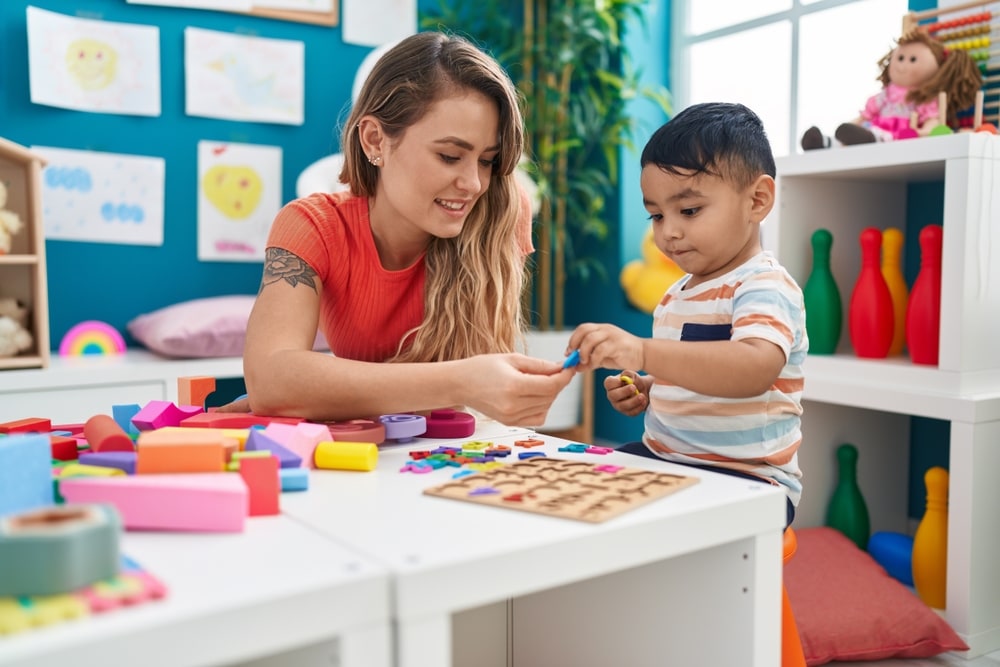Building Strong Bonds: 5 Strategies With Nursery Children

- by Admin
Building Strong Bonds: 5 Strategies With Nursery Children
In the early years of a child’s life, the foundation for emotional, social, and intellectual development is laid. Nursery schools in Wimbledon play a pivotal role in this phase, as they are often the child’s first point of contact outside the family environment. At Wimbledon Day Nursery, we are acutely aware of our role in this developmental phase, as we often represent the child’s first significant interaction outside the familial setting.
Building strong bonds with nursery children is essential for promoting a sense of security, promoting healthy development and supporting academic success. In this article, we will discuss five effective strategies for educators and caregivers in nursery settings to build these beautiful connections.
How to Build a Strong Bond With Your Child
Building a strong bond with your child is the cornerstone of a healthy, nurturing relationship that supports their emotional and psychological development. It lays the foundation for trust, security and mutual respect, enriching both your lives in countless ways.
1. Create a Welcoming Environment
The physical and emotional atmosphere of a nursery can significantly impact a child’s ability to form secure attachments. A welcoming, warm and safe environment encourages children to explore, engage and feel comfortable. This involves more than just colourful decorations and a variety of toys; it’s about creating spaces that reflect the diversity of children’s experiences and backgrounds.
Personalising spaces with children’s artwork, photos and personal items can help them feel valued and at home. Additionally, establishing consistent routines helps children know what to expect, providing a sense of stability and security that is important for building trust.
2. Engage in Active Listening and Empathetic Communication
Active listening is vital in understanding a child’s thoughts, feelings and needs. By giving children undivided attention—making eye contact, kneeling to their level and reflecting back on what they say—educators demonstrate that they value the child’s voice. This practice promotes a trusting relationship and helps children develop their self-esteem and communication skills.
Empathy, the ability to understand and share the feelings of another, is equally important. Responding to children’s emotions with empathy and validation encourages them to express themselves, knowing they will be met with understanding and support.
3. Spending Quality Time with Each Child
In a nursery, individual attention is as important as group activities. Educators can implement this by dedicating time to interact one-on-one with each child regularly. This might involve reading a book together, engaging in a child’s chosen activity or simply talking about their day.
The benefits of spending time with children include children feeling seen and valued as unique individuals and a sense of security and belonging.
4. Incorporating Family Traditions into the Nursery Environment
Bringing family traditions into the nursery setting celebrates the diverse backgrounds of the children and promotes a sense of community. Educators can invite families to share their traditions, whether they relate to cultural festivals, storytelling methods or specific games.
This practice not only enriches the nursery’s cultural tapestry but also makes children feel that their home life is acknowledged and appreciated in their educational environment. It’s a powerful way to build connections between home and nursery, making children feel supported and understood in both realms.
5. Building Positive Relationships with Peers and Educators
Promoting a culture of kindness, respect and cooperation among children and between children and adults is essential. This involves teaching and modelling social skills, such as sharing, taking turns and expressing feelings in constructive ways.
Group activities designed to build teamwork and celebrate collective achievements can promote a sense of community. Additionally, educators should actively mediate conflicts in a manner that teaches problem-solving and empathy, helping children learn to navigate social dynamics positively.
Final Words
The importance of building positive relationships with nursery children cannot be overstated. These early relationships lay the groundwork for children’s future emotional, social and academic success.
By creating a welcoming environment, engaging in active listening and empathetic communication, participating in play, promoting independence while providing support and regularly communicating with parents and caregivers, nursery educators can establish deep, meaningful connections with the children in their care.
These strategies not only benefit the children but also enrich the educators’ professional and personal experiences, creating a nurturing and supportive community for all involved.
At Wimbledon Day Nursery, we understand the importance of the early years in shaping the future of every child. Become part of our community where your child can grow well. Contact us for a visit and see how we can support your child’s growth and happiness.
